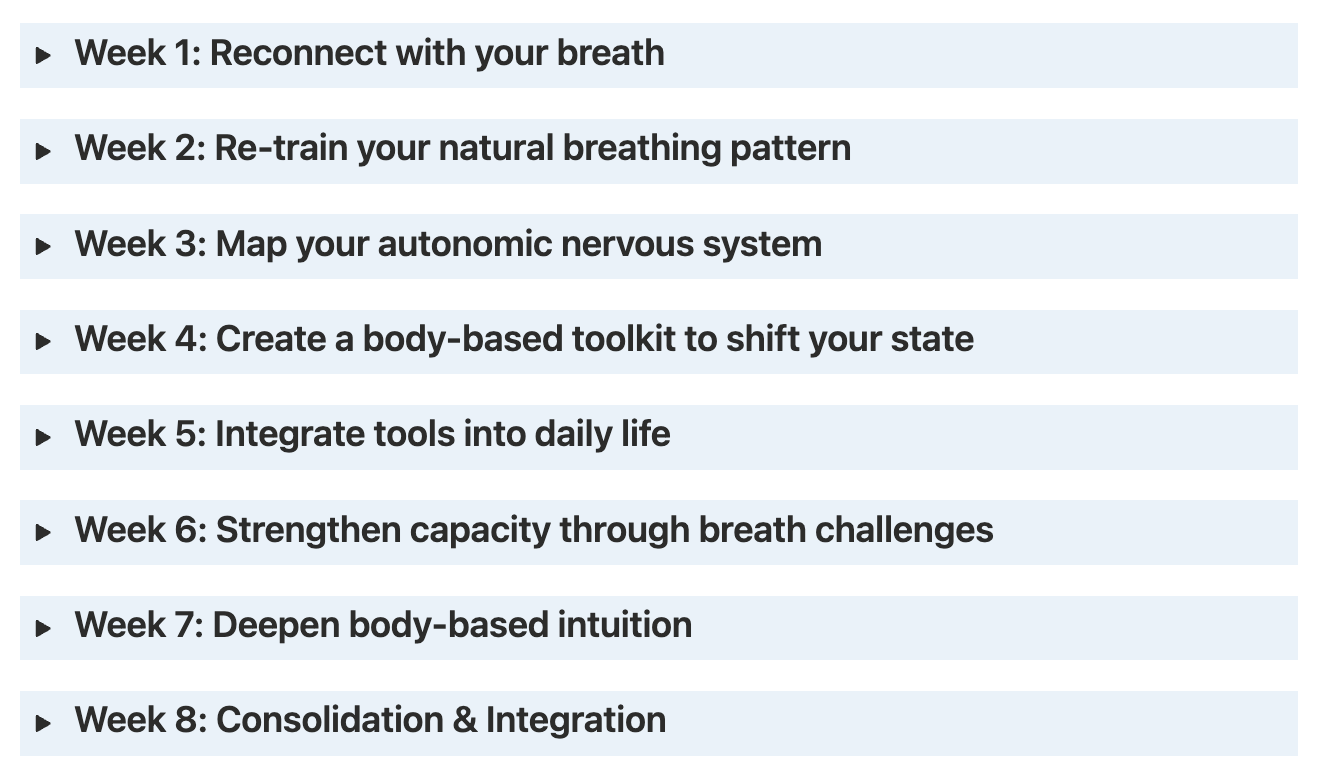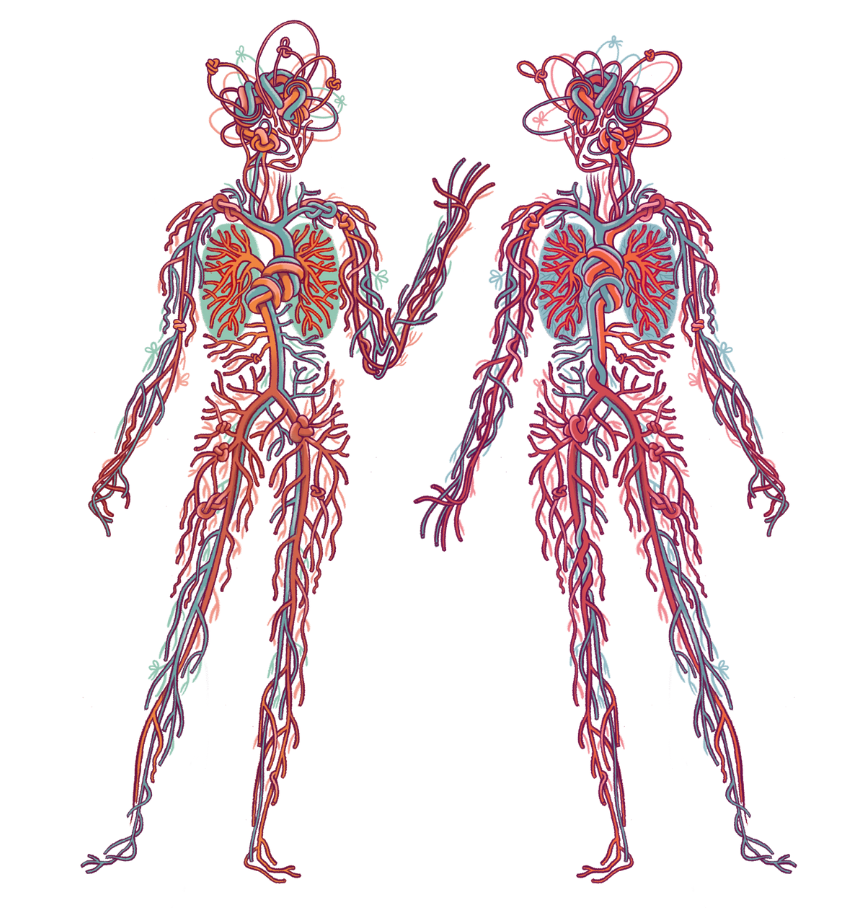
09 Oct Rebuild energy and focus, improve sleep, and build foundational breathing habits
Group Program (February 2026)
The same science-backed breath and body-based tools my 1:1 clients use—now in a small group format.
- 8 weeks (February 2 – March 29, 2026)
- 8 live group training sessions
- Science-backed curriculum
- Daily practice protocols
- Intimate group of max 10 people
Who is this for?
You’ve been working for 10–20 years. You’ve climbed the ladder or are running your own company. You’re respected, capable, and driven. Outwardly, everything looks under control. But under the surface, things feel shaky:
- Sleep is hit-or-miss. You often wake in the middle of the night, mind racing, and struggle to fall back asleep.
- Your mind rarely slows down. Thoughts spin, loops replay. Even in calm moments, it feels like you can’t fully switch off.
- Before meetings or opening your inbox in the morning, there’s a quiet dread. Nothing dramatic, just a heaviness that sneaks in and makes simple things feel harder than they should.
- Emotions can overwhelm you. Stress, frustration, or anxiety swell up quickly, and it feels like you’re at the mercy of them rather than in control.
- Focus is slippery. You sit down to work but often find yourself foggy, distracted, or endlessly toggling between tasks.
- You’ve tried the usual routes (books, podcasts, therapy) but they don’t seem to create lasting change. Maybe you’ve even dipped into meditation or breathwork before, noticed the benefits, but couldn’t make it stick.
These are not mindset problems.
They’re physiology problems. And they’re 100% trainable.
This program is about helping you rebuild an internal foundation—your breath, your nervous system, your ability to shift state in real-time—so you can stop pushing through, and start performing with energy, clarity, and focus.
An 8-week experiential and educational journey

Weeks 1-2: Build Your Foundation
Correct dysfunctional breathing patterns, like over-breathing, chest breathing, mouth breathing. You’ll learn to breathe slowly, nasally, and diaphragmatically, creating a calm baseline for your nervous system. This alone improves sleep, focus, and emotional regulation.
Week 3: Understand Your Autonomic Nervous System
Map your personal nervous system patterns. Learn to recognize your stress signals before they escalate—the jaw tension, shallow chest breath, or racing thoughts that precede overwhelm. You can’t change what you’re not aware of.
Week 4: Build Your State-Shifting Toolkit
Master practical techniques for nervous system regulation: humming, box breathing, physiological sighs, and micro-shifts you can deploy in under 60 seconds. These become your go-to tools for managing stress or shutdown in real time.
Week 5: Integrate Into Daily Life
Apply your tools to real-world situations: before presentations, during traffic, in tense conversations, when sleep won’t come. Practice makes these responses automatic, not effortful.
Week 6: Strengthen Capacity Through Breath Challenges
Build CO₂ tolerance and expand your stress resilience through controlled breath training. This is where you systematically increase what your nervous system can handle, making everyday stressors feel more manageable.
Week 7: Deepen Body-Based Intuition
Learn to track internal signals and sensations, your body’s early warning system for stress, fatigue, and overwhelm. You’ll deepen embodied self-awareness, so you can course-correct before hitting shutdown or burnout.
Week 8: Build Your Autonomous Practice System
Identify the most effective tools you’ve built and create a sustainable long-term practice. You’ll leave with both the skills and the plan to maintain them independently.
Real life results, as reported by clients
- Physiology: Improved breathing efficiency and breath control by 300%. HRV increases by 15-35%. CO₂ tolerance doubles in 6-8 weeks.
- Sleep: Sleep latency drops from 45 minutes to 12 minutes. Wake-ups decrease from 2+ per night to 0-1. Sleep through the night and wake up feeling refreshed.
- State regulation: Down-shift from stress spike to calm focus in under 60 seconds.
- Work performance: 2-3 hour deep-work blocks without burnout. Higher confidence in high-stakes moments.
- Emotional range: Catch stress at the “jaw-tight” level rather than full anxiety.
- Relationships: More presence. Partners notice “calmer energy.”
What’s included
Live Group Sessions
- 8 x weekly 90-minute sessions (recorded for replay)
- Science-backed curriculum: Breathing mechanics and chemistry, Polyvagal theory, HRV coherence, CO₂ tolerance, interoceptive awareness, and more
- A weekly practice session
- Real-time coaching and group learning dynamics
Individual Feedback
- 1 private onboarding and assessment call
- One-on-one breakdown of your specific challenges (chest breathing, over-breathing, mouth breathing) and how to correct them
- Tailored modifications based on your nervous system baseline
Practical Tools & Resources
- Daily practice protocols (30 min/day average)
- Simple metrics tracking (morning CO₂ test, HRV)
- Micro-tools library: 10-second exhales, posture resets, vision shifts, breath holds
- All session recordings and practice guides in organized digital workspace
Small Group Accountability
- Maximum 10 participants for meaningful interaction and personalized attention
- Shared progress tracking and peer support
- Community of ambitious people building the same foundational skills
Program Details
Onboarding
Private onboarding call, inclusive of validated breath and stress assessments
Format
8 live virtual group sessions + science-backed curriculum + daily practice protocols
Duration
8 weeks: February 2 – March 29, 2026
Time commitment
- 90 minutes/week: Live group session (recorded)
- 45 minutes/week: Practice session (optional)
- 30 minutes/day: Guided individual practice (on your own schedule)
Group size
Maximum 10 participants for personalized attention and meaningful group dynamics
Timezones
Sessions will be in both European and American-friendly time slots
Investment
- $1,200 early bird pricing (sign up in 2025)
- $1,400 from January 2026
Why a group program?
There’s such power in shared learning.
While my 1:1 clients get incredible results, witnessing others’ breakthroughs accelerates your own understanding.
In a group setting:
- You learn from 9 other people’s patterns, questions, and progress—not just your own
- Accountability becomes natural when you’re part of a committed cohort
- The cost is less than 1:1 coaching while maintaining individual feedback on the most critical element: your breathing mechanics
- Nervous system work is inherently relational, and so practicing co-regulation in a group builds additional skills you can’t easily develop alone
You still get individualized attention where it matters most: I’ll assess your specific breathing dysfunctions and provide personalized corrections.
“Love this, how do I sign up?!”
Great! I like to talk to everyone I work with, just to make sure it’s a full-body-yes from both sides.
So if you’d like to join, book an exploratory call here.
On the call, we’ll discuss:
- Your current nervous system patterns and stress triggers
- Your goals around sleep, focus, energy, or emotional regulation
- Whether the group format aligns with your learning style
- Any questions about curriculum, time commitment, or outcomes
No pressure, just clarity on whether this cohort is right for you.
Questions?
How is this different from meditation apps or online breathwork courses?
Most apps and courses teach techniques in isolation. This program corrects your foundational breathing dysfunctions first, then builds a personalized nervous system toolkit. You get individual feedback on your specific breathing patterns (something no app can provide) so you’re sure you’re doing the right exercises, and you’re doing them right. Plus, the curriculum integrates polyvagal theory, CO₂ tolerance training, and embodied awareness practices, not just relaxation exercises.
What if I can’t make a live session?
All sessions are recorded. However, live attendance is strongly encouraged for real-time coaching and group learning. The personalized feedback happens live and can’t be fully replicated through recordings.
Do I need special equipment or wearables?
No. A simple timer and your body are sufficient. If you have an Oura ring, Whoop, or similar device, we can incorporate that data, but it’s optional. (I have an Oura ring and love it, but also recommend the Whoop!)
I’m not particularly anxious. Is this still relevant?
Absolutely. Many clients come for performance optimization, not anxiety management. If you experience scattered focus, inconsistent energy, shallow sleep, or want faster recovery from stress spikes, nervous system training is the way to go.
What happens after 8 weeks?
You’ll have systematic skills and daily practices to continue independently. You can always move to 1:1 coaching for advanced work, but the goal is really self-sufficiency. You’ll keep access to the curriculum, the recordings, and the resources library.
Is this therapy?
No. This is skill-based coaching focused on nervous system regulation and physiology. If you’re managing clinical anxiety, depression, or trauma, this can complement therapy but doesn’t replace it.
What’s the difference between this and your 1:1 Expansion program?
Same curriculum and focus on building foundational breathing, nervous system regulation, and expanding capacity. The group program offers the structure and community of cohort learning at a lower price point, while 1:1 provides more intensive personalized support and flexibility in pacing.
